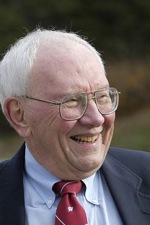Bernard Easterday: More than 50 years of dedication to the UW
In Kenya the Masai call him “Leshan,” which translates to “born during the rains,” and honor him as a village elder. He is still quick to greet people with “jambo jambo,” the traditional Swahili greeting.

Easterday
But in Wisconsin, Dr. Bernard Easterday is best known as professor and dean emeritus of the University of Wisconsin School of Veterinary Medicine. This year he celebrates 50 years of activity on the University of Wisconsin campus.
He and his spouse, Char, reside near Brooklyn, Wis., and they’ve made several trips to east Africa, including four tours that they hosted for Wisconsin Alumni Association.
It was on a 2002 safari in Kenya that Easterday was made an elder in the Masai village Enchoro Olasho and given the name Leshan as a token of respect.
“The rains have special significance to the Masai,” he says. “They’re herders, and their wealth is in their cattle. Good rains mean good grazing and therefore more wealth.”
Easterday received his veterinary medical degree from Michigan State University and his Ph.D. in virology from UW–Madison. He was instrumental in developing and establishing the School of Veterinary Medicine, and served as its first dean from 1979 to 1994.
Now retired, Easterday still serves the School of Veterinary Medicine as professor and dean emeritus.
He continues to participate in new student orientation each year, organizing a panel discussion entitled “What it has meant to me to be a veterinarian,” contributes to other courses in the DVM curriculum, and is involved in Grandparents University.
Among several campus roles, Easterday has served for many years as a senior advisor to the UW Center for Global Health and will continue to be an integral contributor to the campus’ new Global Health Institute. In addition, Easterday is busy writing the school’s history.
Joining the faculty of the Department of Veterinary Sciences in June 1961, Easterday was intent on working with viral diseases of livestock. Specifically, he is best known for research in animal and bird influenza viruses. While conducting research with pigs, he developed an interest in influenza.
He began working with a colleague practitioner, Pawlisch, in Brodhead, Wis., and together they were the first to virologically demonstrate conclusively the transmission of swine influenza from pigs to humans. In the early 1960s, influenza viruses were first isolated from turkeys in the U.S. and Canada.
With the appearance of influenza virus in turkeys in Wisconsin in 1966, Easterday began studies on the nature of the disease in that population. Because of the interaction of turkeys “on range” with various free flying species, he also began to look at the possibility of influenza virus infections in wild birds, especially migratory waterfowl.
The first isolations of influenza viruses from migratory waterfowl in Wisconsin were made in 1974. Subsequently, it was demonstrated that those viruses could be recovered on a regular basis from several species of migratory ducks. In recent years, transmission of influenza viruses from avian species to humans has been shown in various places around the world.
In 1963, the World Health Organization invited Easterday to participate in a collaborative study on animal influenza viruses. That study involved participants from many countries and continued for more than 20 years, an effort Easterday credits to his longtime friend and colleague, Dr. Martin Kaplan.
Easterday also helped advance knowledge of viral diseases like Newcastle disease in birds, Rift Valley fever in both animals and humans, and enteric diseases of swine.
He has been a prolific writer and researcher, publishing more than 100 scholarly articles and chapters in 16 textbooks.
Today, Easterday, when he’s not flying his airplane, can be found in his office at the School of Veterinary Medicine or in a classroom, proudly teaching the next generation of veterinarians.
